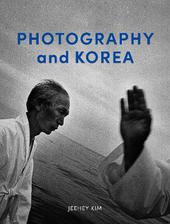
|
Photography and Korea
Hardback
Main Details
| Title |
Photography and Korea
|
| Authors and Contributors |
By (author) Jeehey Kim
|
| Physical Properties |
| Format:Hardback | | Pages:272 | | Dimensions(mm): Height 250,Width 190 |
|
| Category/Genre | Photography and photographs |
|---|
| ISBN/Barcode |
9781789147100
|
| Audience | | Postgraduate, Research & Scholarly | |
|---|
| Illustrations |
134 illustrations, 70 in colour
|
|
Publishing Details |
| Publisher |
Reaktion Books
|
| Imprint |
Reaktion Books
|
| NZ Release Date |
1 September 2023 |
| Publication Country |
United Kingdom
|
Description
Photography and Korea is the first history of Korean photography for a Western readership. The book moves from the late nineteenth century, when Korean travellers brought Western photographic technology home from China, through to modern times. Jeehey Kim presents multiple visions of the country, including the divided North and South Korea as imagined through foreign eyes, Korean diasporas, important Korean artists, and local professional and vernacular photographers. Kim also addresses studio and institutional practices during the Japanese colonial period, how photography is interwoven with Korean political and cultural history, and the divergence of practices after the division of Korea. Featuring numerous striking images, this book is essential reading for all who are interested in the history of photography in Korea.
Author Biography
Jeehey Kim is an Assistant Professor of the Art History programme at the University of Arizona. She has published widely on the history of photography, visual culture and film studies in East Asia.
Reviews"A pioneering study and key resource for scholars of photography history, visual culture, Korean studies, and East Asian studies. Photography and Korea's broad scope, including vernacular photography and printed materials, allows us to visualize the dispersed stories of Korean photography and anchors them in photographic discourse. Not only does this book provide a framework for photo historians focusing on the region but it also contributes to the decolonization and diversification and of the history of photography."--Boyoung Chang, Vanderbilt University
|